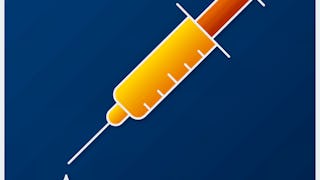- Browse
- How Things Work
Results for "how things work"
 Status: Free TrialFree TrialU
Status: Free TrialFree TrialUUniversity of Michigan
Skills you'll gain: Generative AI, Artificial Intelligence, Image Analysis, Creativity, Prompt Engineering, Design Software, Responsible AI, Innovation, Problem Solving, Critical Thinking
4.6·Rating, 4.6 out of 5 stars54 reviewsBeginner · Course · 1 - 3 Months
 Status: Free TrialFree TrialD
Status: Free TrialFree TrialDDartmouth College
Skills you'll gain: Scientific Methods, General Science and Research, Physics, Physical Science, Experimentation, Ancient History, Vibrations, Mechanics, World History, European History, Deductive Reasoning, Applied Mathematics
4.9·Rating, 4.9 out of 5 stars25 reviewsBeginner · Course · 1 - 4 Weeks
 Status: Free TrialFree TrialD
Status: Free TrialFree TrialDDartmouth College
Skills you'll gain: Decision Making, Strategic Decision-Making, Self-Awareness, Emotional Intelligence, Critical Thinking, Behavioral Economics, Problem Solving, Leadership Development, Analysis, Goal Setting, Strategic Leadership, Risk Analysis, Cognitive flexibility
4.8·Rating, 4.8 out of 5 stars194 reviewsBeginner · Course · 1 - 4 Weeks
 Status: Free TrialFree TrialL
Status: Free TrialFree TrialLLondon Business School
Skills you'll gain: Artificial Intelligence and Machine Learning (AI/ML), Leadership Studies, Organizational Leadership, Responsible AI, Business Transformation, Artificial Intelligence, Communication, Stakeholder Communications, Technology Strategies, Business Strategy, Business Ethics, Machine Learning, Case Studies, Decision Making
4.5·Rating, 4.5 out of 5 stars51 reviewsIntermediate · Course · 1 - 3 Months
 Status: Free TrialFree TrialI
Status: Free TrialFree TrialIImperial College London
Skills you'll gain: Immunology, Epidemiology, Infectious Diseases, Public Health, Drug Development, Climate Change Programs, Health Disparities, Clinical Trials, New Product Development, Manufacturing Processes
4.9·Rating, 4.9 out of 5 stars52 reviewsIntermediate · Course · 1 - 4 Weeks
 Status: PreviewPreviewK
Status: PreviewPreviewKKorea Advanced Institute of Science and Technology(KAIST)
Skills you'll gain: Mechanics, Mechanical Engineering, Torque (Physics), Vibrations, Engineering Analysis, Physics, Applied Mathematics, Calculus
4.6·Rating, 4.6 out of 5 stars26 reviewsIntermediate · Course · 3 - 6 Months
 Status: PreviewPreviewN
Status: PreviewPreviewNNanyang Technological University, Singapore
Skills you'll gain: Geometry, Materials science, Chemistry, Art History, Architectural Design, Chemical Engineering, Physical Science, Applied Mathematics, Biology
3.7·Rating, 3.7 out of 5 stars7 reviewsBeginner · Course · 1 - 3 Months
 Status: Free TrialFree TrialC
Status: Free TrialFree TrialCCoursera
Skills you'll gain: Figma (Design Software), UI Components, Style Guides, Wireframing, Software Design, Mockups, Application Design, Web Design, Application Development, Software Engineering
4.4·Rating, 4.4 out of 5 stars171 reviewsIntermediate · Guided Project · Less Than 2 Hours
 Status: FreeFreeP
Status: FreeFreePPrinceton University
Skills you'll gain: Blockchain, Cryptography, Encryption, FinTech, Digital Assets, Network Protocols, Transaction Processing, Data Storage, Distributed Computing, Emerging Technologies, Scripting, Market Dynamics
4.6·Rating, 4.6 out of 5 stars3.1K reviewsMixed · Course · 1 - 3 Months
 Status: FreeFreeU
Status: FreeFreeUUniversity of Alberta
Skills you'll gain: Physics, Storytelling, Scientific Methods, Science and Research, General Science and Research, Simulations, Scientific Visualization
4.8·Rating, 4.8 out of 5 stars1.2K reviewsBeginner · Course · 1 - 3 Months
 Status: PreviewPreviewS
Status: PreviewPreviewSStanford University
Skills you'll gain: Physics, Timelines, Verification And Validation, Scientific Methods, Research, Mechanics, Mathematical Modeling, Systems Of Measurement
4.9·Rating, 4.9 out of 5 stars3.2K reviewsBeginner · Course · 1 - 3 Months
 Status: PreviewPreviewG
Status: PreviewPreviewGGeorgia Institute of Technology
Skills you'll gain: Materials science, Chemistry, Structural Analysis, Mechanical Engineering, Chemical Engineering, Physical Science, Semiconductors
4.8·Rating, 4.8 out of 5 stars1.3K reviewsMixed · Course · 1 - 3 Months
Searches related to how things work
In summary, here are 10 of our most popular how things work courses
- AI Basics and Tools for Creativity: University of Michigan
- Question Reality: Cosmos: Dartmouth College
- Decision-Making: Blending Art & Science: Dartmouth College
- New Ways of Working in an AI World: London Business School
- How Vaccines Work: Imperial College London
- Rigid Body Dynamics: Korea Advanced Institute of Science and Technology(KAIST)
- Beauty, Form & Function: An Exploration of Symmetry: Nanyang Technological University, Singapore
- Work with Components in Figma: Coursera
- Bitcoin and Cryptocurrency Technologies: Princeton University
- Astro 101: Black Holes: University of Alberta










